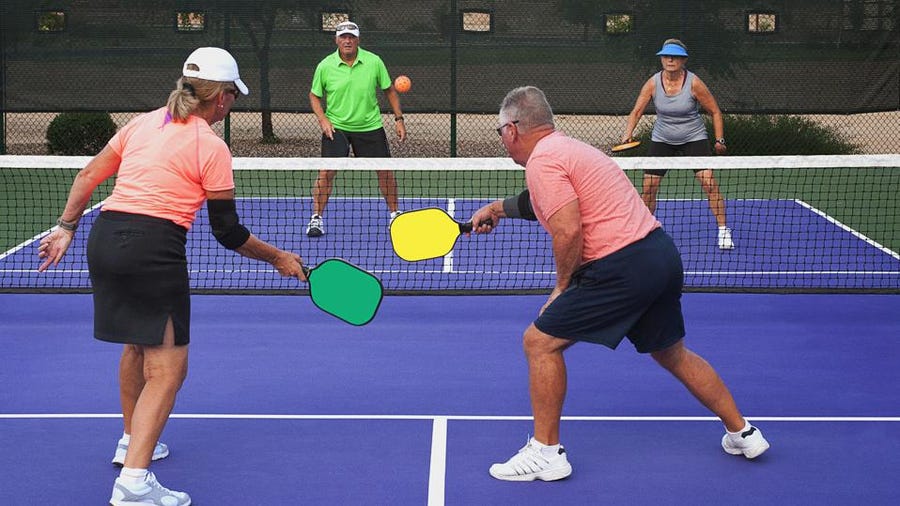



Pickleball is one of the fastest-growing sports in the US. However, with its increasing popularity, there is also a concern that has been rising day by day surrounding the sport. Pickleball noise is driving everyone nuts! The incessant pop-pop-pop of the popular sport has brought on a nationwide scourge of unneighborly clashes, calls to the police, lawsuits, petitions, and whatnot! Do we have any solution to this ever-rising problem? Well, here’s how a city in Georgia has stepped up with an interesting plan to reduce noise from pickleball.
Watch What’s Trending Now!
Recently, new regulations were approved in Avondale Estates as they attempt to cut down the noises and the frequent complaints that are often seen around the pickleball courts off Dartmouth Avenue. According to the new rules, only softer balls which are designed to reduce the noise will be used. There is also a recommendation for using noise-reducing paddles, requiring reservations and charging non-residents $5 for usage. For reservations, pickleball players can reserve a court through the city’s website or the Reserve My Court app.
Now, after seeing all these, a question may arise in the minds about why pickleball is so noisy. Well, the equipment used to play pickleball causes the most noise issues. Unlike tennis, usually, the balls that are used in pickleball are made from hard plastics. In fact, many pickleball paddles also have a hollow built-up which contributes more towards creating a fair amount of noise. Although noise levels vary, the average pickleball sound ranks at about 70 decibels.
Just for a better understanding, 70 decibels is about the same as a washing machine or dishwasher running. It’s pretty much a moderate noise level and it’s not harmful. However, anything above that can be annoying. Since we often tend to draw a comparison of pickleball with tennis, the sounds from a tennis match-minus all those loud grunts from some players (like Aryna Sabalenka definitely!) is about 55 decibels. And that’s quite like the sound of a conversation!
Many neighbors who live next to this #pickleball court in #Berkeley say the noise from players whacking the ball back & forth is “unbearable.” Two players I spoke to say they sympathize w/ residents & hope the city builds another court elsewhere. Thoughts on the noise?@nbcbayarea pic.twitter.com/8TCM6AIADY
— Melissa Colorado (@melissacolorado) November 16, 2020
Apart from balls, and paddles, even surfaces made of concrete or asphalt can create a fair bit of noise. Smaller courts generally tend to create more constant noises than bigger courts and in pickleball, we mostly see smaller courts. What are the reactions to these new regulations and is there anything else that can be done to battle this issue in one of the most popular sports in America?
What can be done to reduce the problem associated with Pickleball
According to a few players, some say that the softer balls won’t play the same they did with the harder balls. Then there are some who claim that the softer balls will solve the issue. However, those who live near the pickleball courts aren’t too sure whether these new regulations will solve the issue or not. Apart from what’s happening on the courts, the increasing popularity of the sport is pulling more crowds towards the sport. As a result, automatically the decibels now tend to go higher than usual.
Commissioner Lionel Laratte said, “I’m not fully aligned with it but I think it is what it is. It’s the best that we are going to be able to do.” Now the question is what else can be done in the near future apart from these? Well, there are quite a few options to help reduce the pickleball noise. None of these alone can be a perfect solution to this problem, but it can definitely help to fight this problem.
First and foremost thing is to build courts at least 500ft from any bordering residence. Then, choosing a court surface made with rubber or foam can also help minimize the sound of the ball bouncing. Apart from that constructing the court with noise barriers can also significantly reduce the noise levels. For example, constructing sound-dampening walls and surfacing can do wonders in addressing this issue. These are all long-term goals and they will require the construction of new courts.
The city is now also looking for opportunities to partner with DeKalb County Schools or Wellroot to build courts near DeKalb School of the Arts or the former Avondale Pattillo United Methodist Church property. Share your thoughts on the new regulations. Do you think these are enough to combat this issue?

